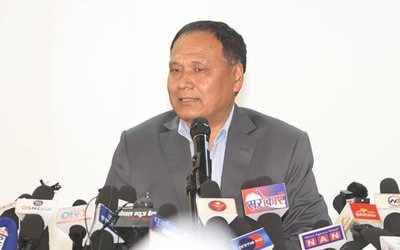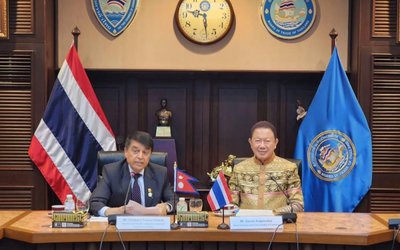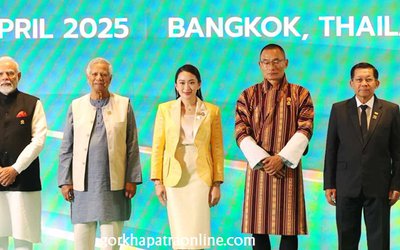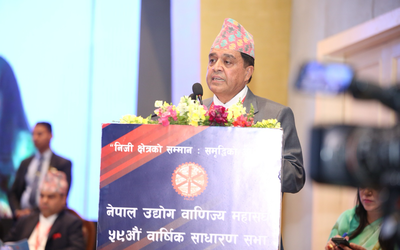Nepal-USA Chamber of Commerce and Industry (NUSACCI) were established 21 years ago with the aim to strengthen the bilateral relations between the two countries to promote American investment in Nepal. NUSACCI was established in 1994 with an organized effort of private sector entrepreneurs. Since its establishment, this association has been advocating for ways to strengthen Nepal-America bilateral economic relations, to promote industries and to expand the professional relations so as to increase American investment in Nepal and increase Nepalese export. This Chamber has members from diverse industrial and trade sectors. Its members represent from business firms, banks, companies, tourism, handicraft, garment, carpet and pashmina industries, consulting firms, computer, energy producers and pharmaceuticals and other related industries. The Chamber which aims to develop entrepreneurs through private sector relations-always receives encouragement and support from Industry and Trade Ministry and U.S. Embassy.
Nepal and America established diplomatic relations in 1948. However, the relations between the two countries do not only depend on the formalities. United States is one of the important partners and allies in Nepal’s development. Besides, the U.S. is also a major market for Nepalese products and an attractive destination for Nepalese students for higher education. The U.S. has played a very important role in the development of education, heath, agriculture, hydropower and other economic sectors.
Fifteen years ago, American market used to be a major market for Nepalese garment products. This helped Nepal to increase export, generate employment and flourish business. Following the implementation of Multi Fiber Agreement (MFA), Nepal has lost quota access in American market. This had affected Nepalese export badly as well as the employment opportunity. In the last few years, Nepal's surplus trade balance with the U.S is narrowing. Nepal’s export to United States was Rs. 930.90 million in 2014 and it was just Rs. 554.65 million in 2015.
Nepal and United States have been taking initiatives to increase Nepal’s industrial export to United States. Nepal Trade Integrated Strategy 2016 has included garments as a priority sector for export. Similarly, Trade and Investment Frame Work Agreement signed between Nepal and the U.S in 2011 was one of the positive steps towards the promotion and expansion of bilateral trade and commerce. Private sector is experiencing that the agreement has not moved as expected by the private sector. I would like to request both the governments to take certain initiatives in this regard.
So far as American investment in Nepal is concerned, it is a very little, compared to other countries. According to the data of 2014-015, 250 industries were registered with American investment. The investments covered mainly the areas like agriculture, energy production, tourism and software. Our studies have shown that there is immense possibility for American investment in Nepal. To promote American investment in Nepal, I would like to request the concerned authority of Nepal to sign the Avoidance of Double Taxation Agreement and Bilateral Investment Promotion Agreement with United States.
For the traders, particularly garments producers and exporters, there is good news -- the signing of Trade Facilitation Trade Enforcement Act by U.S. President Obama recently. After the devastating earthquakes of April, 2015, United States introduced this act to promote Nepalese export to United States. After the signing of this act, Nepalese products like carpet shawl and scarf will get duty free access in the American market by fulfilling the prescribed standards. Under this act, if Nepal gets ten years' duty free access in U.S. Market, Nepalese market will expand. We would like to request both the governments to clarify about the provisions included in the act.
There is no doubt that economic development is Nepal’s top priority now. We don’t have other alternatives than to intensify economic activities, expand industries and promote employment. For this, Nepal needs to create transparent, conducive and investment friendly environment. It is a fact that private sector is an engine for economic development. As private sector’s contribution in the economy is over seventy percent, the government needs to change its attitude towards private sector. Government and private sector are now walking together. However, we need further closer cooperation with the government.
It is a fact that the country has been passing through a political transition due to political disputes. We now have the new constitution but economic agenda is still lagging behind. After a long effort of private sector, the parliament has recently passed Industrial Promotion Act and Special Economic Zone Act. Despite passing these two acts, there is still the need to bring new acts, including Labor Act, Social Security Act and Foreign Investment and Technology Transfer Act to create conducive environment for foreign investment. As Nepal is unable to create conducive investment environment, large numbers of Nepalese youth are leaving the country and Nepal’s trade deficit has increased by 13 folds. This is the reason there is the need to have close partnership between the government and private sector.
After this annual general meeting, my tenure as a president will come to an end and new president will take charge. It is a matter of privilege for me to lead the Chamber as its chairman.
(Basnyat was president of NUSACCI). Excerpts of the statement delivered at the 21st Annual General Meeting)
- Reconstructing Nepal: Global Prospective
- Jun 03, 2015
- Sweet Power Deals Against Bitter Reality
- Sep 26, 2014
- CNI'S Information Portal
- Jun 07, 2014
- On Nepal, Czech Trade Opportunities
- Oct 06, 2013
- Nepal and Czech Republic have immense opportunities for Trade
- Sep 16, 2013
















